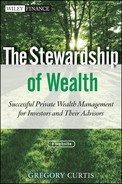Chapter 17
Working with Money Managers
I'm more interested in the return of my money than in the return on my money.
—Mark Twain
Working with money managers1 is the aspect of the investment process that is usually the most interesting for investors, but that all too often adds least to the growth of investor wealth. In fact, one of the principal methods of identifying investors who will encounter little success over time is to observe those who are most obsessed with money managers.
The reason that money managers typically subtract value from, rather than add value to, the investment process is not that money managers are incompetent, but that their services are, on the whole, overpriced relative to the value they bring to their customers. In the asset classes that matter most to investors—U.S. large- and mid-cap stocks and bonds—most managers will underperform over time by at least an amount equal to their fees and trading costs, to say nothing of taxes. In the more complex and obscure asset classes, where useful information is difficult to come by, talented and hardworking managers may modestly add value net of all costs.
The main reason investors spend so much time and emotional energy on working with managers, despite the modest-to-negative return we are likely to receive for our efforts, is that money managers are actual human beings, whereas almost all other aspects of the investment process are purely intellectual. It's a lot more fun and a lot more interesting to spend time talking with an intelligent money manager than it is to run mean variance optimization algorithms or participate in long conference calls with accountants about tax-managing our portfolios.
In this chapter I try to address a couple of the principal issues associated with money managers. Specifically:
- Why it is so difficult to identify best-in-class managers in time to profit by investing with them.
- Why it is that good past performance can be completely meaningless.
- I identify the (mainly qualitative) characteristics of best-in-class managers.
- I describe best practices in identifying best-in-class managers.
- I discuss, briefly, some approaches to optimizing the mix of managers in investment portfolios.
The issue of selecting money managers is very closely associated with the challenge of identifying optimal strategies for each asset class that will be included in our portfolios. Hence, this chapter should be read in conjunction with Chapters 11 through 16. Some information is duplicated in these chapters for the sake of clarity of the presentation.
